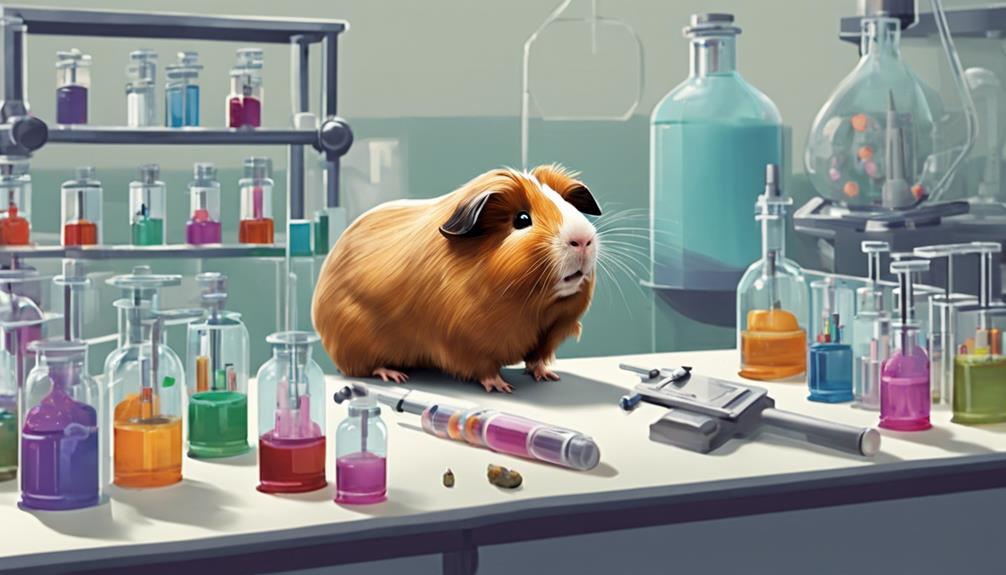Guinea Pig Contributions to the Pharmaceutical Industry
Did you know that guinea pigs have been used in pharmaceutical research for over a century, with around 2.7 million guinea pigs being utilized annually for various studies?
These small rodents play a crucial role in advancing medicine and drug development.
Their unique biological characteristics make them valuable models for testing new medications and understanding disease mechanisms.
Explore how guinea pigs continue to make significant contributions to the pharmaceutical industry through their involvement in drug efficacy studies, vaccine development, and more.
Guinea Pig Models for Drug Testing
Guinea pigs play a crucial role in pharmaceutical research as effective models for drug testing. When it comes to guinea pig toxicity testing, researchers rely on these furry creatures due to their similarities in drug metabolism to humans. Their liver enzymes and metabolic pathways are comparable, making them valuable in predicting human responses to drugs. Moreover, guinea pigs are commonly used in studying drug absorption. Their gastrointestinal tract closely resembles that of humans, aiding in understanding how drugs are taken up by the body.
In guinea pig drug dosing studies, these animals are instrumental in determining the appropriate dosage of pharmaceuticals. Their size and physiology make them suitable for calculating safe and effective doses for humans. By studying how drugs distribute and accumulate in guinea pigs, researchers can extrapolate this data to optimize dosing regimens for human patients. Additionally, guinea pigs provide insights into the efficacy of drugs through their responses to various treatments. Their role in drug testing extends beyond mere toxicity assessments, encompassing a holistic view of drug behavior in living organisms. These aspects make guinea pigs indispensable in pharmaceutical research, paving the way for safer and more effective medications for humans.
Guinea Pig Studies on Drug Efficacy
Studying drug efficacy in guinea pigs offers valuable insights into how medications perform in living organisms, shedding light on their effectiveness and potential applications for human patients. Guinea pig dosing and efficacy trials play a crucial role in determining the effectiveness of pharmaceuticals.
Here are some key aspects to consider:
- Dosing Considerations: Guinea pigs are often used in studies to determine the appropriate dosage of a drug. Their size, metabolism, and physiological characteristics make them suitable for testing different dose levels to find the optimal balance between efficacy and safety.
- Comparative Efficacy Trials: Guinea pigs are utilized in comparative efficacy trials to evaluate the effectiveness of new drugs compared to existing treatments. These trials help researchers understand the potential benefits of novel medications and how they stack up against standard therapies.
- Long-term Efficacy Assessment: Guinea pigs are valuable in assessing the long-term efficacy of drugs over an extended period. By monitoring the animals' response to treatment over time, researchers can gather important data on the sustained effectiveness of medications.
- Efficacy in Disease Models: Guinea pigs are employed in creating disease models to study drug efficacy in specific conditions. These models mimic human diseases, allowing researchers to test the effectiveness of medications in a controlled environment before moving to human trials.
Guinea Pigs in Vaccine Development

Exploring the role of guinea pigs in developing vaccines offers valuable insights into their contribution to medical advancements. Guinea pig immunology plays a crucial role in vaccine development. These animals have similar immune responses to humans, making them valuable models for studying vaccine efficacy and safety. Guinea pigs have been instrumental in the research and development of various vaccines, aiding in the identification of optimal vaccination strategies.
In the field of guinea pig infectious disease research, these animals have been pivotal in testing and refining vaccination strategies. Their susceptibility to certain pathogens allows researchers to study the effectiveness of vaccines in preventing infection. Guinea pigs have been used to evaluate vaccine candidates for diseases such as pertussis, influenza, and pneumococcal infections. By studying the immune responses of guinea pigs to these vaccines, researchers can gain valuable insights into how vaccines may perform in human trials.
Guinea Pig Trials for New Medications
Trials involving guinea pigs are essential in assessing the efficacy of new medications. These furry creatures play a crucial role in determining how drugs affect living organisms, providing valuable insights that help researchers make informed decisions.
Here are some key aspects to consider when conducting guinea pig trials for new medications:
- Guinea Pig Toxicity Studies: Guinea pigs are commonly used in toxicity studies to evaluate the adverse effects of new medications. By observing how guinea pigs react to different dosages of a drug, researchers can assess its safety profile and potential risks before human trials.
- Guinea Pig Drug Metabolism: Understanding how guinea pigs metabolize drugs is crucial for predicting how medications will behave in humans. Guinea pigs have metabolic pathways similar to humans, making them valuable models for studying drug metabolism and pharmacokinetics.
- Dose-response Relationships: Guinea pig trials help establish dose-response relationships, determining the most effective dose of a medication while minimizing side effects. This information is critical for optimizing treatment regimens and ensuring patient safety.
- Pharmacokinetic Studies: Guinea pigs are used in pharmacokinetic studies to investigate how drugs are absorbed, distributed, metabolized, and excreted in the body. By studying these processes in guinea pigs, researchers can better understand the pharmacological behavior of new medications.
Guinea Pig Research on Disease Treatments
Guinea pigs have significantly contributed to research on disease treatments by serving as valuable models for studying the effectiveness of various pharmaceutical interventions. In guinea pig immunology research, these animals have been instrumental in understanding how diseases affect the immune system and how different drugs can modulate immune responses. By studying guinea pigs, researchers have gained insights into how certain medications can boost immunity or suppress inflammatory reactions, leading to advancements in treating a wide range of diseases.
Moreover, guinea pigs play a crucial role in toxicity testing. These animals are used to evaluate the safety of new drugs by assessing potential adverse effects and determining safe dosage levels. Through guinea pig toxicity testing, researchers can identify any harmful side effects early in the development process, helping to prevent risks to human health during clinical trials and beyond. This testing ensures that pharmaceutical interventions intended for disease treatments aren't only effective but also safe for patients.
Guinea Pig Contributions to Pharmacokinetics
In understanding pharmacokinetics, guinea pigs have proven invaluable due to their physiological similarities to humans. These furry creatures have played a crucial role in advancing our knowledge of how drugs move through the body, helping researchers make informed decisions about drug development and dosages. Here are some key ways guinea pigs contribute to pharmacokinetics:
- Guinea pig metabolism: Guinea pigs metabolize drugs in a manner comparable to humans, providing valuable insights into how different compounds are broken down in the body and how this process can affect drug effectiveness and potential side effects.
- Drug absorption: Studying how drugs are absorbed in guinea pigs helps researchers understand the factors that influence drug absorption rates, bioavailability, and the onset of action, which are essential considerations in drug development.
- Guinea pig drug distribution: By examining how drugs distribute within the bodies of guinea pigs, scientists can gain valuable information on how medications spread to different tissues and organs, guiding the optimization of drug formulations and delivery methods.
- Elimination: Guinea pigs assist in studying the mechanisms of drug elimination from the body, shedding light on factors that influence drug clearance rates, half-life, and the potential for accumulation, all of which are critical in determining dosing regimens and treatment duration.
Through their contributions to pharmacokinetics, guinea pigs continue to be instrumental in shaping the pharmaceutical landscape and improving the efficacy and safety of medications for human use.
Guinea Pig Role in Drug Safety Studies

Exploring the safety profile of pharmaceuticals, understanding the guinea pig's role in drug safety studies sheds light on crucial aspects of medication evaluation and potential risks for human use. Guinea pigs play a vital role in drug development through toxicity studies. These studies help researchers assess the safety of new medications before they're tested on humans. Guinea pigs are commonly used in these studies due to their sensitivity to certain substances, making them ideal models for predicting potential risks and side effects in humans.
In the pharmaceutical industry, guinea pig safety assessments are integral to ensuring the effectiveness and safety of drugs. By exposing guinea pigs to varying doses of a drug, researchers can observe its effects on the animals' physiology and behavior. Through these assessments, valuable insights are gained regarding the drug's potential toxicity and any adverse reactions that may occur. This information is crucial for determining the appropriate dosage levels for human trials and identifying any safety concerns early in the drug development process.
Guinea Pigs in Pharmacology Research
Playing a crucial role in pharmacology research, guinea pigs provide valuable insights into the effects of drugs on physiology and behavior. These small rodents are instrumental in understanding how drugs interact with living organisms and help researchers make informed decisions about drug development and safety.
- Guinea pig metabolism studies: Guinea pigs are commonly used in pharmacology research to study how drugs are metabolized in their bodies. This information is vital in determining appropriate dosages for human medications.
- Drug toxicity assessments: Guinea pigs are utilized to assess the potential toxicity of new drugs. By observing how guinea pigs react to different doses of a substance, researchers can predict potential side effects in humans.
- Guinea pig drug interactions: Researchers study how drugs interact with each other when administered to guinea pigs. This information is crucial in preventing harmful drug combinations in human patients.
- Pharmacological responses: Guinea pigs help researchers understand the pharmacological responses to drugs. By monitoring guinea pigs' physiological and behavioral changes after drug administration, scientists can predict how humans may respond to the same medications.
Frequently Asked Questions
How Are Guinea Pigs Selected for Specific Drug Testing Studies in the Pharmaceutical Industry?
When selecting guinea pigs for drug testing studies in the pharmaceutical industry, researchers consider various selection criteria such as age, weight, health status, and genetic background. Guinea pigs are chosen based on how well they fit the specific requirements outlined in the experimental protocols.
What Types of Ethical Considerations Are Taken Into Account When Using Guinea Pigs in Pharmaceutical Research?
When using guinea pigs in pharmaceutical research, it's crucial to prioritize animal welfare and adhere to strict ethical guidelines. Research ethics demand careful consideration of the well-being of these test subjects.
Ethical guidelines mandate that animal testing must be conducted ethically and responsibly. By upholding these standards, researchers can ensure the humane treatment of guinea pigs while advancing scientific knowledge in the pharmaceutical industry.
Are There Any Specific Regulations or Guidelines in Place Regarding the Use of Guinea Pigs in Drug Trials?
When it comes to using guinea pigs in drug trials, there are specific regulations and guidelines in place to ensure their well-being. These rules govern the selection process, treatment, and monitoring of these animals.
Ethical considerations are crucial, with a focus on minimizing side effects and gaining valuable insights.
Following these regulations and guidelines is essential to conducting ethical and effective pharmaceutical research involving guinea pigs.
How Do Researchers Ensure the Well-Being and Humane Treatment of Guinea Pigs During Pharmaceutical Studies?
To ensure the well-being and humane treatment of guinea pigs during pharmaceutical studies, researchers prioritize ethical treatment and implement strict research methods. Monitoring their health closely, providing comfortable living conditions, and offering proper nutrition are essential.
Regular veterinary checks, minimizing stress, and following established guidelines contribute to their welfare. By maintaining high standards of care and respecting their needs, researchers uphold ethical practices in conducting pharmaceutical studies with guinea pigs.
Can Guinea Pig Research in Pharmacology Provide Insights Into Potential Side Effects or Long-Term Impacts of Medications on Human Health?
When conducting drug testing on guinea pigs, researchers gain insights into potential side effects and long-term outcomes of medications. By studying these aspects, they can better understand how drugs may affect human health over extended periods.
Guinea pig research in pharmacology offers valuable information that can help predict and prevent adverse reactions in humans, ultimately contributing to safer and more effective medications for various conditions.
Conclusion
Overall, guinea pigs play a crucial role in the pharmaceutical industry, contributing to:
- Drug testing
- Efficacy studies
- Vaccine development
- Medication trials
- Disease treatments
- Pharmacokinetics
- Drug safety studies
- Pharmacology research
Their unique physiological similarities to humans make them valuable research subjects, helping to advance medical science and improve treatments for various conditions.
Guinea pigs are unsung heroes in the quest for better medications and healthcare solutions.
